Text








SAVING FACE (2004), dir. Alice Wu
46 notes
·
View notes
Text

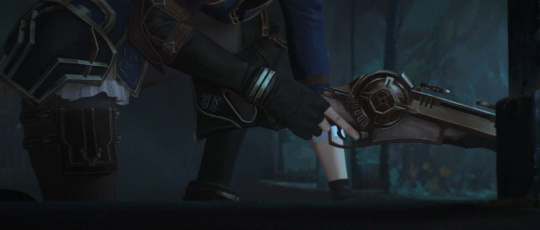






ARCANE 2x03 || CAITLYN KIRAMMAN
#arcane#arcane gifs#caitlyn kiramman#caitlyn kiramman gifs#and if i told u guys ive been playing league for years would we be surprised#are we even surprised at this gifset#but i can make a million arcane gifsets. just say the word#also i tried brightning and working on contrast for these for the tumblr layout eh we will see#some of them look a little odd but its ok baby's first time
93 notes
·
View notes
Text
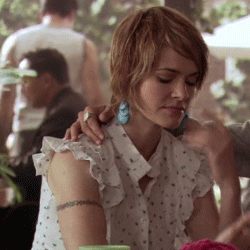
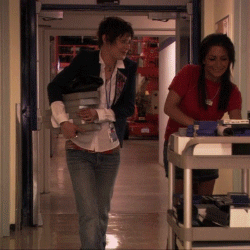
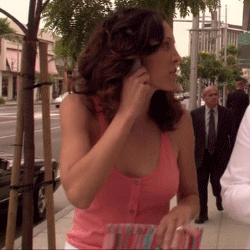

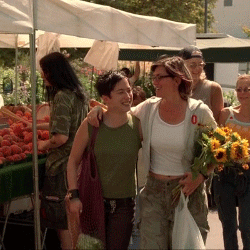
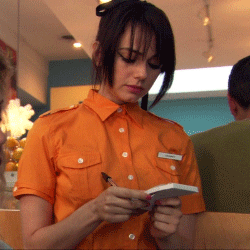


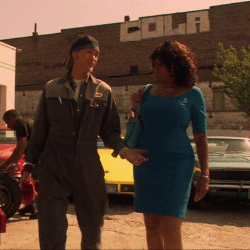

The L Word: Lookbook ↳ 2.01, Life, Loss, Leaving
#the l word#jennifer schecter#mia kirshner#bette porter#jennifer beals#shane mccutcheon#kate moennig#tina kennard#laurel holloman#kit porter#pam grier#ivan aycock#kelly lynch#dana fairbanks#erin daniels#alice pieszecki#leisha hailey#carmen de la pica morales#sarah shahi#ok i tried to find the two random farmers market lesbians but i couldnt#easily the highlight of the ep for me but also tbf anytime the l word has LESBIANS in the background or whatever who look anything less tha#the supermodel perfect appealing main ensemble my eyes get huge and i see You. I . See. You. doesnt even matter if theyre just acting lets#just enjoy the peeks of reality the l word gives us so briefly#jenny staring at them Sigh jenny u were so butchfemme tbh if only chaiken knew how to 'write' or could envision lesbians who didnt look lik#like... like this like that like perfectly feminine conventionally attractive amalgamations of Showtime Produced Television#anyway her staring at them and also soon when she gets the haircut like i just know what u are#anyway theyre all cute here i also forgot this was the bizarre kit realising ivan is like i dont even know actually like whatever#more of my tags will be along this line as this entire season goes down again#but again jennys cute waitress outfit and ugh#tlwlb
416 notes
·
View notes
Text


MIA KIRSHNER as JENNY SCHECTER | The L Word, season 2, episode 1.
42 notes
·
View notes
Text










The L Word: Lookbook ↳ 1.14, Limb from Limb
#the l word#jennifer schecter#mia kirshner#bette porter#jennifer beals#kate moennig#shane mccutcheon#tina kennard#laurel holloman#kit porter#pam grier#kelly lynch#ivan aycock#dana fairbanks#erin daniels#tlw#tlwlb#ok this took so long even when i was making it and not procrastinating it#why u ask? well#despite loving tlw season1 so much i actually think this episode it starts getting loopy and therefore bad#as i was editing this together i was like yep absolutely no one looked good in this one#EXCEPT JENNY who is always on top#and ... tina#. yep. sorry her on the floor fixing something udner the desk or whatever... so cute#but its finally done . and everyone looks really bad in s2 except alice#but can i get a round of applause or something
141 notes
·
View notes
Text

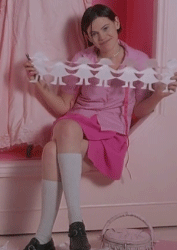




Clea DuVall as Graham Eaton | But I’m a Cheerleader (1999) dir. Jamie Babit
121 notes
·
View notes
Text






BUT I’M A CHEERLEADER (1999) dir. Jamie Babbit
#but i'm a cheerleader#natasha lyonne#clea duvall#films#filmgifs#raced against the edible to make this and lost terribly
42 notes
·
View notes
Text




BUT I’M A CHEERLEADER (1999) dir. Jamie Babbit
#But I'm a Cheerleader#natasha lyonne#clea duvall#mine#filmgifs#film#guess who didn't want to resize these dopwn from 500px so theyre just huge
62 notes
·
View notes
Note
honestly, what's your take on the l word? atp i can't tell if it's just shit but i'm too far along to stop. the 5th and 6th seasons seem to be done in a complete different tone too and there's so many problematic aspects just slapped in for unecessary drama. still.. i like the main characters a lot and it is representation at the end of the day. Maybe it would've been cooler if they just did more of a 'slice of life' thing instead of 'drama rama cheating on people is like a slip of the hand thing due to the strong nuclear force'
anyway interested in your take, what do you think are the well- and badly- handled aspects of the show, how do you reflect on the story and character building?
stay cool out there (◕‿◕)♡
MY TAKE ON THE L WORD? getting this ask made me so excited you have no idea how much I love talking about the l word. So excited in fact that I wrote 6165 words about it, sorry, I am so severely unemployed right now. here, I talk about my thoughts, some theory, and then break down some of the intrinsic problems with the show, specifically how it thinks about gender and nonconformity, race, and transgender identities, within the scaffolding of it being a show concerned with women who have relationships with other women, rather than necessarily a truth of lesbianism. i’m citing various linked sources and very loosely using an academic approach, but it’s more like a messy collage of sources than it is a fully fleshed out argument and narrative! if you want the tl;dr, I’d recommend scrolling to the final 3 paragraphs
tbh I haven’t watched it in a while but I really want to rewatch the whole thing and go back to my gif series instead of just making random sets (don’t be put off by my absence its bc I was doing my master’s degree and then I got really sick) and maybe thinking so intensely about tlw these past 3 days will inspire me into it .
I’d be really interested in hearing any thoughts on response to any of this, even though it’s not particularly well written or formulated, so feel free to drop a message/reply/response anywhere if u or anyone else is compelled to. anyway response under the cut ->
so, my opening thoughts on the l word revolve around two things: there is nothing about this show that makes it an inherently lesbian show, and that it functions as a product of its time, not in culture but in Hollywood and show running. the imagined audience of TLW isn’t necessarily the modern ‘sapphic’ audience watching things like First Kill (2022), Do Revenge (2022), or Crush (2022) which are all, generally, pointed towards a younger audience seeking things like validation and romantic projection (from what I understand, and I’ll admit I haven’t watched any of these! But I have read synopsis and seen clips, so I’ll watch soon I promise). I do think this conversation has re-emerged a little in the growing conversations about wanting sexy lesbians having sex, which is a conversation that surrounded Love Lies Bleeding (LLB, 2024) for quite a while, repeating this argument that what lesbians want isn’t romance or tension, but sex, real sex, sex on screen and sex on TV. of course, it’s a little difficult for showrunners to ‘do’ sex or sexual content without it being so brazenly for men – and here I’ll step out and say when, in this context, I discuss women being looked at and ‘male gaze’, it’s more under the original theory of laura mulvey that women are objectified by the camera as men are in control of production, and here I’ll link the article (it’s very short, but I refer largely here to section B) – and to equally appeal to women looking at women but who are, equally not free from patriarchal understandings of the ‘correct’ and ‘incorrect’ ways of being attracted to women. I feel a good example of how we saw this was the big tiktok-wide discussion about sapphic cottage-core as an equally white endeavour, a sort of softcore launching of racist white American ideals of frolicking on a plantation. For showrunners to produce sexual lesbian content now, it needs to contend with who will be doing its marketing for them, i.e. a lot of people on tiktok talking about how LLB is for the ‘lesbian gaze’, whatever that means, or that these things are perhaps attractive to men in general, but are specifically geared to being attractive to lesbians specifically. Actually candace Moore, in a really brilliant article (and if u want access and don’t have it… just let me know) describes, through gaze theory, the notion of the straight viewer as a “tourist” and the “traveller”. Here:
Problematizing a distinction between the tourist, who "gladly or unknowingly accepts Disneyland's versions of the world's wonders," and the traveler, who "seeks and knows how to recognize authenticity," Strain argues that perhaps these archetypes are, if not one and the same, both victims to the notion that there is an "authenticity" available to be misrecognized, or grasped, in the first place. (10) But what of the lesbian viewer? (11) At first glance it would seem that the lesbian viewer falls outside of the already-tenuous tourist and traveler distinction, being a "local" intimately familiar with this culture. However, insofar as lesbian spectators are consuming mediated images of themselves, I argue that not only do straight audiences engage in a form of tourism when viewing the The L Word, but lesbian audiences, even those from Southern California, do too. The distinction between the tourist, the traveler, and, in this case, the local-as-consumer becomes blurred. Locals drawn to the latest "lesbian attraction," lesbians enjoy The L Word's eye candy along with straight "tourists." Like straight "travelers," they seek to identify albeit illusory "authentic" elements of the representation. However, for the queer viewer, the mediated reality of the show will never match up to reality. While the tourist and the traveler of The L Word are at base one and the same, the distinction between them lies not in what they are, but what they think they are; how they conceive of their own intentions, levels of "expertise," relationships to the local culture, and the "gains" that they take away--whether they travel for pleasure or for knowledge. It is through the enticement of lesbian sex (a spectacle of attraction for straight and queer viewers alike) and through the wonderment of either "understanding" the other or "recognizing" oneself (fantasy of authenticity), through both "watching from a remove" and "being there," that The L Word captivates its straight and queer tourists.
Pulling away from the academic angle, I don’t agree with the idea of LLB being for a lesbian gaze, nor do I think that TLW was ‘for’ lesbians more than it was ‘enjoyed’ by lesbians – a show that can hit as many audiences at once is a good thing. dennis cass for the slade in 2004 wrote that the L word “often feels like it’s not about being gay at all” and that a lot of what the show presents is pretty removed from any lesbian experience as we know it, additionally writing on bette and tina’s marriage counselling that they “aren’t merely in couples therapy, they’re seeing one of L.A.’s hottest personal gurus—that you not only forget they’re lesbians, but that they live on Earth.” A pretty accurate read for how removed a lot of TLW is from anything, and, to me, sort of bypasses any notion of ‘representation’ by just how fantastical it is. ginia bellafante also wrote in 2009, after s6 aired, that “’The L Word’ is a Sapphic Playboy fantasia in which women with wrinkles or squishy thighs or an aversion to lingerie appear to have been flagged down on the freeway with urgent instructions to move to Seattle”. basically, yeah
TLW itself is very clearly appealing to its heterosexual audiences at the same time it appeals to lesbians, even through the same mechanisms – the character’s conventional attractiveness, their skinniness, their lack of bras and how you can 9/10 times see their nipples through their shirts, and all the lesbian sex shown in as much detail as they could get away with – and that is the core driving force of the show in a lot of ways. we can’t really have another TLW today for the same reasons that all media from the early 2000s has shifted to give women more complex characters, arcs, appearances, and functions – and that’s a good thing, obviously – which in turn demonstrates the lack of these things the characters in TLW actually had. At its core, it’s sexy and men are the people behind the companies getting it on TV, not necessarily specific men but the shadow of patriarchy and how women exist on the screen. This isn’t to say media creation and output has become a liberal utopia for women’s rights, but rather there has definitely been a shift in how women exist on screen and what roles they were given before – think easy fast and furious, or megan fox in transformers, or even how very popular musicians styled themselves and appeared to the massive; Shakira, Jennifer lopez, Britney spears, etc – which, to me, reflects a way in which TLW capitalises off the straight heteropatriarchy in its desire to show sexy women at all times, always available to be ogled. in a way, this sorta aligns with bellafante’s observation that the show had ‘never aligned itself with the traditionalist ambitions of a large faction of the gay rights movement’ (written in 2009, 6 years before gay marriage was legalised in the us) – the liberator in the l word is sex, and that’s what all the characters are constantly aiming for, nothing else. Similarly, the show gets so obsessed with defining who or what a lesbian is (throughout the whole of s1 as they look for signs of lesbianism in jenny, with jenny at that party, or with dana talking about her ‘gaydar’, and so by doing this it turns lesbianism into a visual brand, something that be hidden in plain sight, appeasing both the hetrosexual viewer and the lesbian seeker - Martina Ladendorf describes a branding of lesbian identities through TLW in a form of “thingification”, and so “the representations of lesbian identities are discursively displaced and the identity position “lesbian” is partially filled with new meanings in the televised text of The L-word.” Ladendorf offers a far more generous reading than I do – to me, a lot of TLW needs to extrapolate lesbians from their womanhood and vice versa, creating a sort of woman who is a lesbian, rather than, simply, a lesbian
naturally, the l word is inherently a misogynist show , and in a lot of ways I think it’s unavoidable to think about when it comes to discussing schematics or opinions of the show, it’s a show full of, in the words of liz feldman in this interview, ‘beautiful lesbians with just nothing but time on their hands… and just somehow also money’. Obviously, the stereotypes the show puts forwards make it feel pretty cheap at time, and when the show ventures out into attempting to either tackle or just include plotlines about poverty, racism, transphobia, infidelity, (or plotlines it totally avoids, like conversations on butchness, gender non-conformity, or transfemininity), it honestly just gets stranger and stranger, not to mention the very active racism present in the show, via how pam grier’s character was written, handled, and expanded upon when she was by far one of the most skilled and seasoned actors on the show. a lot of issues I and other people have are through this lens, and hence why a lot of the pushback focuses on how little was understood about trans people in mainstream media back then, or how the show was just such a landmark moment that it was purely reflective of the times so it’s just nit-picking to be pointing out all its negative parts, which isn’t a sentiment I agree with at all, and instead I think of the l word as being both progressive and problematic for these reasons. Even as an addition, I feel like TLW is why we just don’t really need more tv shows like the L word… because we have the L word, and it’d be nice if we could have something different
so, when I talk about and recommend the l word I usually put it in these terms: season 1 is a phenomenal piece of storytelling and such a compelling way to create and introduce a show all about lesbianism to a world that is not filled with parallel lesbians, but rather is the only show on air in the world doing that exactly, and, following that, season 4 gets a little art deco and experimental as it pushes its characters through new, meaningful struggle, like tasha working in the military under ‘don’t ask don’t tell’ (fuck the army though), max living his new reality as a trans man (yeah it was dealt with horribly), bette dating jodi and this inviting so much conversation about art, disability, and deafness into the mix, and, in other ways, jenny and tina working together on her show, helena’s… gambling addiction or whatever, kit’s nonsense relationship shane’s nonsensical relationship. Imo these two seasons show the best of what the L word has to offer, which is, in S1, a sensitive introduction that pushes jenny through the wringer as she really becomes herself and takes hold of her destiny, and then in S4, these characters all essentially performing at their apex, in love, making mistakes, trying again, to the best of the l word’s ability to show any of this (relatively speaking, it’s the best TLW ever gets)
with all this in mind, I do think the show thrives in really profound ways at times. The real hook of it is, and always has been, season 1, which is just this ferociously strong exploration in television about such a serious sensitive topic, jenny’s coming out. a lot of criticism sort of facetiously responds to jenny’s character by focusing on her writing quality (which I honestly thought was fine lol!), and will ignore sincerely engaging with her in favour of laughing at how bad her character became as the writer’s lost the plot more and more, but I really do think that jenny in the first two seasons was just phenomenal, and mia kirshner’s fantastic meditative performance just stole the entire show for me. In season 1 as we are introduced to the show and their world through jenny’s process of coming out and ripping her life apart at the seams to live her ideal life (even if it was very explosive with marina and didn’t end well), which I just thought was such captivating writing about that moment of choice, where a character has to decide whether or not they’ll live their easy life or do the difficult thing. one of the scenes I have always come back to is in s1 where jenny has sex with tim and cries afterwards because that moment for her is the one where she realises she just can’t do it anymore, and seeing that in the show was just really otherworldly for me, I loved it and I thought it was amazing, and then later on in season 2 where jenny asks shane to cut her hair for her – a real splitting off from her regular, comfortable life, to ‘become’ a lesbian in heart and soul, was again just another moment where the writing and directing teams could really show some muscle in just how good the show could be, before dropping all presences and going back to whatever drivel they’d been doing. As a more technical note on the show, the inconsistent directors and writing is really hilarious, and sometimes the drop in quality between episodes is… staggering, to say the least
tbh s1 functions well as a drama-comedy mix because those scenes, as well as tina and bette’s fertility journey, is spliced within the rest of the nonsense going on, which I felt crafted this really enjoyable diametric swing throughout . arguably more than anything, jenny’s coming out was the best and most meaningful part of the show, and I really haven’t seen much other lesbian media hold a candle to it (though I could name a few). What they did with jenny as the show went on was disappointing to say the least, but s2 had a lot of heart in it as they attempted to have her coming to terms with her abuse (naturally, having finally discovered herself in s1) and focus more on what makes her happy – her writing. As the show continued to develop and jenny’s character just morphed into this unrecognisable thing, I even still think mia kirshner could perform such a charming take on it that I never really aligned myself to a lot of the jenny hate people joke about
other drama aspects in mind, like bette and tina’s marriage falling apart, bette’s other relationships (bette always seems to be the one facing the ‘serious problems), and even dana’s cancer and subsequent death, I thought were generally handled… ‘well’. Dana’s cancer worked interestingly within this as, while it was kind of bizarre, I think the relationship between alice and dana was a real life force on the show for a while, and that whole situation meant that alice could go through some real, meaningful growth in her character which she’d been a little starved of to that point. perhaps my thoughts are that when the show focuses on cheating as the only method of things falling apart, that’s when it really starts to fumble, because cheating at that level is such a sitcom-only esque plotline that removes a lot of reality you might be looking for and finding charming in these shows. Equally, I just think cheating can be quite an alienating plotline!
But, to talk about writing alone, my god it gets shit. Various parts of the writing I remember disliking off the top of my head are dana’s season 2 girlfriend which turns into a weird trope of the pretty girls vs the ‘uglier’ one (her then-gf), when the max arc is in full swing (though I’ll be clear as well and say I loved Daniel Sea’s acting within the role, however bad the writing was), papi and the racism that guided the writers in constructing her character, the random plotline of the guy living with shane and jenny in season 2 (though I thought it could have been really interesting, almost a meta comment on men watching lesbians, men watching the l word, men watching lesbians in media). Helena’s entire character was a little baffling to me, and while I did enjoy her at times and thought she was a hilarious addition to the cast, I just had no clue exactly what she was doing. Parts of the shows ideology itself is equally harmful, like alice and dana shopping for strap-ons (bc alice is bisexual and therefore loves penetrative sex, and dana is a lesbian and therefore doesn’t), or just that the shows ensemble cast reflects the background, and everyone is cis white thin feminine, etc. until they’re not, like ivan or papi, or Dylan..? (or a character’s non-whiteness function as a sort of ethnic flair to them, say papi and carmen being Latina and that being their exciting ‘exotic’ traits), that floods the show with a very recognisable sort of white Hollywood liberalism, and if we can understand and comprehend that, we get a good working frame for the rest of what’s going on. as alice and tasha were arguing about the military it was, of course, them trying to suggest that alice is this very liberal character who disagrees with the war and tasha’s politics, but not enough to…. Break things off with her. Instead (fashion tumblr user steps in) she even joins in this roleplay and dresses more femininely around her, growing out her hair a little and everything – and alice in general usually had a pretty fluid sense of style, so it was an… interesting choice. And then Jamie shows up for some reason (and is similarly one of the very few reoccurring Asian characters on the show – her, Catherine (one of helena’s stupid love interests) and adele (who is not serious); actually to make a side note on how this show was received, there was even a petition to get the character’s from alice wu’s Saving Face (which is a brilliant movie, and you should watch it) to be on the show and bring more Asian representation, from autumn 2008)
One episode I think is pretty good for reading the ethos of how TLW engages with women who aren’t their ‘ideals’ is shown is, imo, episode 3? 4? of season 1, where lacey is harassing shane for moving on from her. Lacey is one of the very few characters who leans a little more into being gender nonconforming, yes still with the full face of makeup, but with heavy punk-ish eye makeup, short hair, leather jacket, a demanding attitude, (and she’s not fat, but definietely has more weight on her than any of the verrrrry skinny main cast), and all-in-all embodies a kind of paltry attempt at TLW at bringing in someone with more of an edge, perhaps a modern day masc we might imagine – she’s really one of the only women I can think of on the show, let alone women that shane gets with, who isn’t an ultra-feminine character with long hair, tall, skinny, petite frame, etc. devoid of reality, the show really pushes on her as this over-demanding woman who reactedly badly to shane using her and moving on, and of course the show is trying to show us that shane uses people without much care for them, but doing so through lacey lets you sympathise more with shane than it would if they’d brought in a far more feminine woman who could play that damsel in distress role through looks alone. Lacey’s problems are like a pet or a child’s wherein you do what they want (in this case, another 1 night stand) to appease them, and then you get them off your back. The writing itself is very bizarre, but the fact that they used a woman who was just a little left of centre from the standard the show had set of these beautiful women in Hollywood, demonstrates enough
likewise, to go from here and talk about gender non-conformity, one of the strangest lines on the show was always kit in season 3 episode 9 saying “It just saddens me to see so many of our strong butch girls giving up their womanhood to be a man” – why she said that, I don’t know, some sort of meditation on her bizarre relationship with ivan perhaps? But that relationship fell apart because ivan was… not a man… and couldn’t be a man… whereas max is a man and could be a man, so I just don’t know.
Kit: Why can't you be the butchest butch in the world... and keep your body? Max: Because I wanna feel whole.
and he is so punished for that split away from butchness into transness, even by the woman who is notably placed outside of the lesbianism of the show – which is arguably worse than having one of the lesbians come at him for it, as kit is more or less representative of “the rest of the world” in these types of conversations, pushing max away from transition while the lesbians of the show, the ones who, you would imagine, have had some sort of intersection with transness once before (again, notably shane, who, as part of her traumatic backstory, was mistaken for a boy when she was a teenager and was paid by men to give them a handjobs) . instead the show curiously places kit there as some voice of reason, and the rest of the lesbian cast are kind of fast and loose with the whole thing. when they do talk about butchness in s3e3, it’s just bizarre. Pre-transition max pulls shane with him to unpack the car as “us butches”, and carmen giggles and jokingly calls shane a “big butch” even though, again, she’s the closest thing the show gets to reoccurring butchism, and is likely seen and imagined as butch by a lot of the people watching . at dinner later on in the episode, they make a joke about him not being “stone butch”… as if that’s a way of measuring masculinity rather than a sexual identity, before shane interrupts the conversation to say “You know what, what difference does it make whether someone is butch or femme?”. again, she is the butchest one at the table, and very notable not butch, but has gone up so close to the border before, you really wonder… why. Why there is such intense resolution to not make her butch, but really it’s because TLW functions in the absence of the butch – alice eler puts it succinctly: “The L-Word asserts that a “femme” lesbian woman is more desirable than a “butch” lesbian.”
In tlw, butch and femme are always roles played rather than realities lived, so it defaults to femininity being ‘standard’ - and this is where, imo, a lot of reaction to max’s transition hinges on. If the show can’t allow any character to firmly be ‘butch’, so when a character takes on butchness as a passage to realising his truth, that he is a trans man, it pulls out all the ugly thoughts and feelings held by certain lesbians about trans men who were, previously, identifying as lesbians/butch lesbians. Here, it really creates a perfect storm for TLW to uphold dangerous ideology (how they showed max’s transition was horrible), and justifying their cis lesbian audience’s response (they got angry that the only character who transgressed gender went ‘too far’ with it, essentially, living his truth in a way they didn’t like). I imagine, if TLW had functioning butch characters on the show, this all might’ve played out differently, but if TLW let go of its standard of femininity, then it… isn’t sexy, becoming too lesbian and too trans and alienates its non-lesbian audience, getting too deeply invested in its lesbianism than it is with its glamour. An interview with Ilene chiaken that gets thrown around a lot is here: on max, “She’s our first real butch on the show — a fabulously attractive butch, but nonetheless a real butch,” Chaiken said. “And we deal with the issue of gender. We wanted to tell that story, a big story in the gay community and, in the last couple years, a huge story in the lesbian community.” it’s an interesting statement for sure– gender transgression has always been a part of lesbianism (read any book ever), and with the advent of the internet and online communities – afterellen being founded in 2002 – more conversations could be had by lesbians from all walks of life, from any economic background or lived reality of race, ability, anything. jack halberstam writes interestingly in Transgender Butch about butch/ftm borders that,
The distinction that some butches need to make between lesbianism and butchness hinges on a distinction between sexual and gender identities. Lesbian, obviously, refers to sexual preference and to some version of the “woman-loving woman.” Butch, on the other hand, bears a complex relation of disidentification with femininity and femaleness and, in terms of sexual orientation, could refer to “woman-loving butch” or “butch-loving butch.
butchness, and max’s ex-butchness, is never truly interacted or responded to in the show – ivan states he doesn’t mind being referred to as a he, shane half-heartedly defends butchism by asking her friends to stop talking about it, and max finds himself as a man through a meaningful identification with butchism and ‘disidentification’ with femininity to then finding a reidentification with not just masculinity, but manhood, which lends way to him truly discovering himself. Curiously, in response to this, this reidentification is one step too far, and suddenly its actually ok to be butch on the l word. The rest of the cast seems to ask him over and over again, why by a man? Why not be butch? But in the world of TLW, to be butch and to be trans are both radical acts of nonconformity, to disidentify is to no longer be the thing that sells, so you very fundamentally cannot do any of it – lisa the male lesbian in s1 is played for laughs as a transmisogynist punchline, and carmen giggling at the idea of shane being butch (and thus disidentifying) demonstrates that this is equally hilarious.
from this angle, i feel that TLW functions primarily as a show about women attracted to women, not lesbians attracted to lesbians (lesbian as gender, as identifier, as being). Immovable womanhood is the centre of everything, constructing familiarity, and to stray is to exit safe perimeters that TLW establishes within unradical, conformist, cisgendered white femininity. candace Moore, again, writes that TLW “positions lesbianism as a sensibility, not a sexuality. This is particularly important because as a sensibility, lesbianism can potentially be co-opted by straight viewers.”
of course, it would be remiss to fail in mentioning that much of this discussion about tlw’s association to butchness is very much within whiteness as well – we can argue that tasha is a stud even if she never says the word herself, her specific attraction being to “girly girls” and her riding a motorbike, always with a more masculine wardrobe, and being in the……. Army………. Really aligns her with this sentiment. I do think she’s a stud, but this being off the back of the show’s depiction of max sits so strangely, and we can’t ignore that her blackness is so instinctually connected to how they wrote her – in a world where no one else can be a butch, why then is the only dark skinned black lesbian more masculine leaning than the rest of them? yes, racism, and all tied in to her nationalism and dedication to the army. It’s certainly an interesting choice for the writers to make and, while she is one of my favourites in the whole show, I definitely have a lot of pause with why she was written and created the way she was, and what she offers the show politically – she holds space as a particularly vulnerable body, a dark skin black stud lesbian, but maintains the status quo of the country and of American imperialism. What’s the message? Even the most unavailable of lesbians can still be patriots??? the individual's physical unfuckable body is still acessible through american aligience?
As later seasons continued to get worse, parts I did really enjoy were tasha’s entire character, molly’s entire character, seeing tina ‘get her life back’ as it were and return to painting, jodi’s entire character, all the music featured, and bette and tina getting back together was really well written and laurel holloman and Jennifer beals are just two very strong actors steering that ship, and random moments throughout I really enjoyed (specifically bette’s professional life gave a lot of breathing room for the show to have other funny little characters, like her office assistants etc) that I’m struggling to remember here rn tbh but generally even as the show was getting bad, the more ridiculous things got the more fun I was having, but the later seasons ‘drama’ was a little painful. If it had started as a drama and then shifted into something more palatable, I think it would’ve been great, but really anything that wasn’t season 6 would have been fine.. just such an unforgiving and cruel way to end the show, and I thought adding jenny to the mix of toxic sad relationships after leaving her straight life and coming to terms with her abuse was such a mean-spirited and cruel way to end it IDK! And this is why the l word FAILS as a sitcom, bc at least usually (to my knowledge) the idea is that at the end… they’re kinda happy and stepping into another new life with some stability and lifelong friends!!! But instead TLW said fuck you and I hate you
anyway yeah closing thoughts… if you watch TLW without even thinking about representation I think it’s an easy watch, bc what I was watching it for is psycho lesbians who don’t act normally and that’s what I got. All caricatures of themselves or whatever they’re performing in the shadows of, and, in a way – and maybe this is a little weird to say – but I think the lesbians in the show are, to me, like watching a species of lesbian that I myself am not. Which is a shame because, if I recall correctly, a lot of those musical performances in the show were about exposing the world to lesbian music that broke the norm and went against the stereotype of music people associated with lesbians at the time, showing them on the cutting edge of new sound, which somehow did not cross into the actual meat of the show at all. And I haven’t spoken at all about it here, but a lot of those musical features are my favourite parts of the show and made some of those scenes just electric, magical parts of storytelling on tv
to address the “you”/I in what “I think”, and this one actually is TMI, when I first watched the L word, it was when I had really just finished coming to terms with my own lesbianism back in late 2021, early 2022 (I was gay and trans before this, but hiding from myself and my sexuality and my gender in complex ways, living a sort of double life online and offline – this was more an unforgiving reckoning with who I was vs what the life I was leading looked like). i was finally letting myself think about it holistically, reflecting on conversion therapy and how I navigated my desires and my identity. I wrote a lot of melodramatic diary entries and was trying to figure out how to handle a 3 year long semi-formed, confusing, and impressively undefined ‘situation’ship I was in with a guy while I was living alone during a gap year. all I really did in this time was go to the gym, go on walks, go to therapy, and think… a lot. by the time I started watching TLW I had come to terms with my lesbianism (and its inextricable relationship to my gender), but watching jenny go through something I had basically been in the thick of myself (just without all the sex and the cheating and the sex and the sex and the sex), and was, at that point, yet to experience the real horror of, meant a lot to me, and, just from some reading online, I’ve understood too how the early seasons of TLW really helped a lot of other lesbians come out to themselves or start thinking about where they might sit in relation to lesbianism. again, TLW fails time and time again at any sort of political radicalism, but when you’re so, so painfully alone and you don’t really have anyone to talk to about these desires, or even have the strength to talk about these things out loud, I do think somehow the unabashed desire flung around the screen of TLW does one thing, and that is to declare that lesbianism doesn’t have to be in your head, and that even good change can be really difficult when it’s something like this, and that, to me, was the best thing TLW added to the conversation about lesbian TV and reflects, for a lot of lesbians who find themselves trying to navigate repression and abuse, the experience that we’re still moving through: taking hold of our lives with our own hands
beyond that, beyond being a story about transformation – which I do think really permeates the first season (dana coming out to the world and to her parents; shane learning how to love or whatever the fuck genuinely; tina and bette trying and failing and trying to live the life they’d always dreamt of; marina navigating her own bad relationship through a sort of uncaring outwards desire; bette ‘choosing’ the wrong path from her married life and cheating; kit re-entering the world of professional music and working hard to get into that music video thing situation – I think s1 is just such a rare gem of tv, that had so many flaws in it and so much was mishandled, but it came to it all with a lot of heart. But still that same angle is what alienates it from reality and sets it up as this fantasy land of woman-who-engage-in-lesbianism and abstractifies lesbian reality to make way for lesbian (or straight) fantasies of standard hegemony with a little zest. As it goes on however, it falls so hard to the more difficult aspects already clear at its start, and dramatizes their sexual escapades and relationships endlessly in a way that gives, says, and does nothing. jill dolan describes it well, albeit more positively than I have here: “part of the fun has become to simply go with it, to enjoy its excesses of character and plot and to tolerate its rather sweetly absurd attempts at relevance and authenticity.” and you really can ‘go with it’ for a while, but to put it shortly, TLW is not a show worth following to the end of the earth
11 notes
·
View notes
Note
why do i keep thinking dana's hair looked better b4 the makeover lol (like it lowkey framed her face better/ hid it less) am i crazy tho ,,
HI,. HELLO. no you're right, we are talking about shane cutting her hair in 1x10 right? well the problem with shane is she's shit at her job but that's another issue
this got long and turned into more of a dana analysis (1573 words...) so i put it under the cut ->
i'm the worst ever because i honestly prefer dana's sporty look with hair that can be completely tied back when she plays tennis, but generally i kinda had no clue what they were going for with her bc in the feminine women agenda the l word was held prisoner to they wanted her to not be too masculine anyway, which kind of cut her off from having more stereotypically lesbian haircuts that we associate with... lesbians who have played tennis professionally - martina navratilova, billie jean king - like this
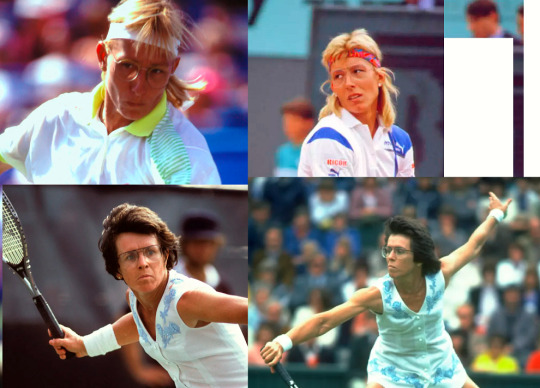
but yeah idk... i prefer the long hair that frames her face if only because it sort of inadvertently makes her jaw look squarer (which i like) and makes her look more intentional with her actions (which she is), so there's genuinely nothing to hide... in a more holistic sense i appreciated her original looks as a sort of reminder of how inescapable her lesbianism to her, the same way her face is more or less thrust outwards and taken in whole every single time. hiding behind the bangs pushes her back and - maybe works in line with her plotline within s2 MAYBE - hides her in a strange way i thought antithetical to her whole story being Transforming into the lesbian sports icon and taking hold of her destiny despite the pushback from her family and society at large
i think you could sorta make the argument of the middle parting no bang look being a sort of straight girl situation, but to me what read as her attempting to appear 'straight' (or, at least, not disruptively 'queer') was always always always those little stud earrings she wears like this assuredly feminine touch throughout, so no matter how many sweaty games of tennis she plays or muscle tees she wears, the jewellery on her is basically acting to say, no! reminder! i'm your straight conservative wifey. especially when jenny throughout is really characterised through her big bold thick bangs that hide her from the world (and work in the narrative), giving dana these strange feather cut bangs was always just a strange decision to me idk. one big issue throughout the show was that shane was the only one really allowed to be androgynous (hard to say she's butch when she doesn't really take up any of the roles or senses of being butch) - beyond a couple of random side characters - so that the other main ensemble had a line in the sand drawn for how far they could stray from conventional femininity, and most of them don't move far from it
the famous "do you have to dress like that" scene between her and shane always made me laugh because her hair is in this slick ponytail and she's wearing this tanktop, clearly coming or going from practice, muscles out, etc... like i would not be seen on the street with u if i was also desperately and fruitlessly trying to hide being a lesbian dana
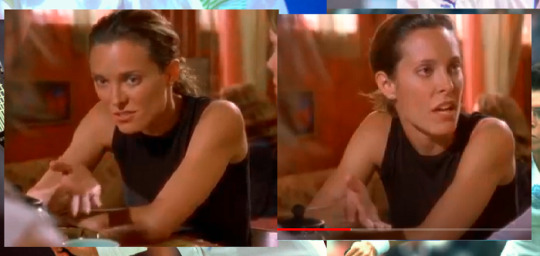
though as a sidenote they really couldn't decide what they wanted with her because while she sort of toed a line between masculine and feminine aesthetics, and erin daniels is obviously gorgeous, they end up pushing her towards feminine when it felt like her character... wanted the other thing,.. (this is me projecting and making shit up though)
her strange gay beard who was convincing no one at the welcoming party
when alice and shade are probing dana on her gaydar and asks "would you wear high heeled sandals with tapered jeans" and it's like the first time she's heard of either of those items of clothing
actually on clothes later in that episode look at this... like are they not aligning dana more with shane than they are alice with those dark jackets ... dana's in jean shane's in leather like
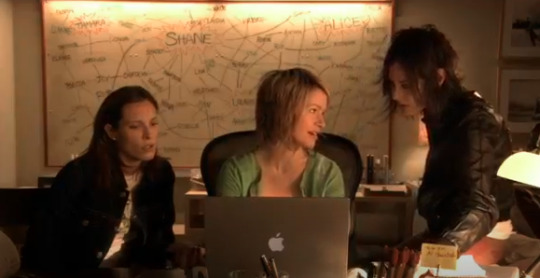
in a way i think a lot of her attraction to lara and circling around this impressively pretty and very feminine woman brings out this awkwardness in dana where she wants the strength to reach out and/or take charge in a way she just can't, one outfit that really sticks out to me is the tight polo she's wearing trying to compliment her in the same episode here
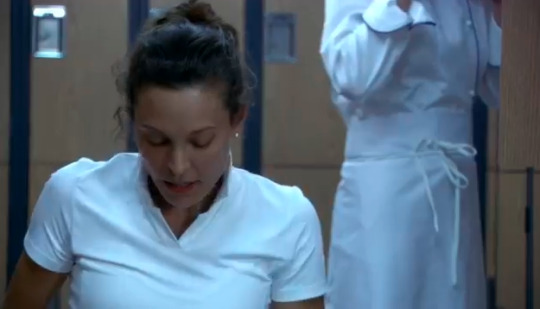
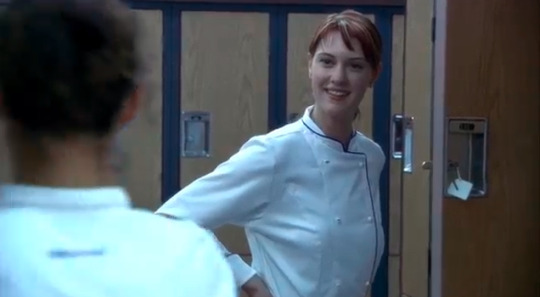
tbh in a way i almost get the sense they they're playing on dana as forced feminine and lara as accepted 'masculine' or rather is comfortable wearing this very blocky unflattering chef's uniform while dana is just so uncomfortably forwards with her face/body (uncomfortable in person not in sports yes it is sports uniform yes)
anyway when dana and lara are breaking up in episode...7? 8? this scene dana is like nervously looking around at all the straight couples and this shot always interested me because she is... looking at the man . the woman is in the centre but dana herself is positioned to the left side of the screen as the man is, and obviously lara is there so dolled up ( i love her entire look this episode) so - IMO - it just read like dana is trying to.. do something akin to him
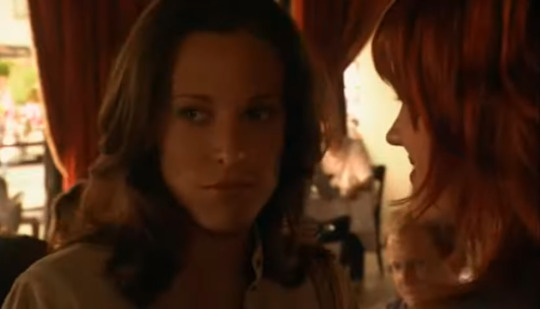
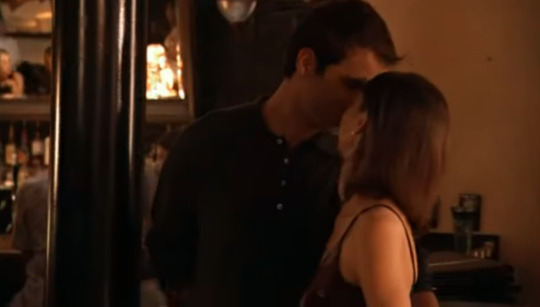
only after lara starts coming on to her does her gaze like actually and meaningfully shift to the woman which to me just read as her being concerned with, specifically, how other women are seeing her. to take on the role of the "man" for the purpose of the "woman", or to try within your limited capacity to do so
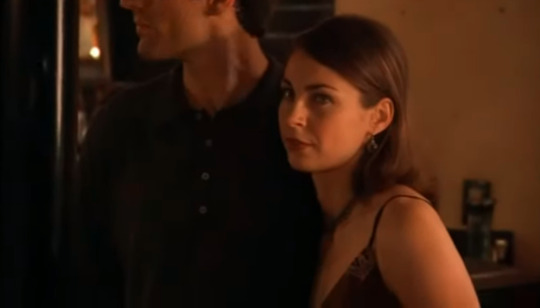
and dana has to do this apologetic speech to lara about how she just can't be gay and "when she hides it she hides the best part of her. but you don't understand what it means to be me" and then "i'm not like you" ugh i just think the whole thing reads as her lesbianism not being as simple as 'being gay' but rather 'BEING' looking, sounding, acting gay, this total containment of herself that needs total release, this very profound lesbianism that demands to be so... brazen, idk....
LIKE THIS PERHAPS
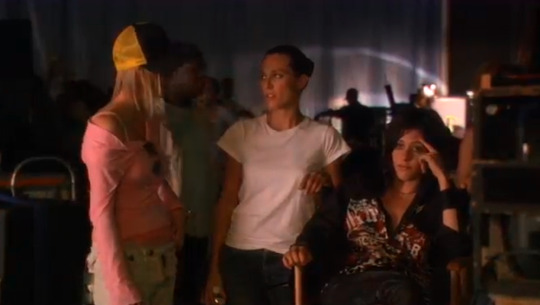
ok this is getting so insanely long for no reason so let me end on one note: THE THING I CANNOT GET OVER. IN GENERAL. IS HOW ON JENNY AND DANA'S DATE SHE... LOOKS... HELP
before this when they were in the bar together i was just thinking so endlessly about dana's move to make jenny comfortable - "i've never done this before" dana: "you've never been to a bar before?" "no, a women's bar, by myself" "oh. me neither"
then jenny says "this is something out of the 1950s its so butch and femme" and dana starts telling her about the history of it and how it "probably hasn';t changed since the fifties" and just keeps talking and talking, trying to comfort jenny on how it's no different to any other club and ETC, in a way it really reminds me of how she interacts with lara when she was giving her a compliment (trying to say she always looks nice. like not dirty. when i . see you.") in that really stilted fashion that, to me, reads as this overly anxious probing into desire but caution, always taking a step back lest you took too many forwards, a delicate tapping around her own attraction and her role in these entanglements
anyway the outfit, and this happens at the end of the haircut episode in the first place, so this is her hot off shane's awful hairdressing chair:
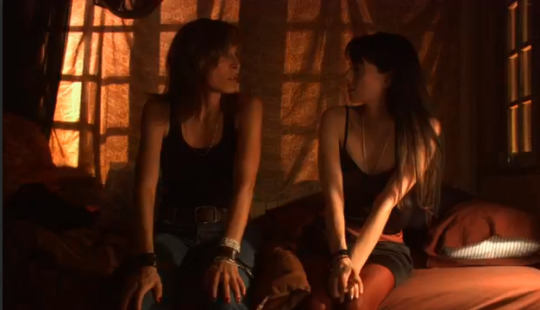
like i'm sorry they are in the same outfit virtually but they dolled dana up so strangely with makeup here (and earlier in the episode) that this was so baffling, because she is in butch uniform right now with those insane leather? metal? cuffs around her wrists, i had no idea what was going on here. in the same outfit more or less but fashioned and functioning so differently, jenny's accentuating her shyness and uncertainty, arguably her hair covering up more than her vest does, sharp angles of the v pointing down, sat in the light, on the edge of becoming ephemeral . dana positioned more in the shadow, planted firm, the thick arms of her vest and the round neck keeping your attention straight across her shoulders and thus leading to her arms . ignore the godawful belt here again i think that the jeans being 'high' waisted and the strange brown belt was just another attempt by the evil costume designers to try and create some sort of 'chapstick' lesbian aesthetic, but really imo these attempts just give way to dana's own desire to lean more masculine but trapped within her almost innate inability to do so meaningfully
SIDENOTE: i realise this is supposed to be some hilarious comedy scene to be like omg hahaha lool jenny and dana? lmaooo but i kinda think they should have gotten together for real and this should have been danas true butch awakening like look at her . now imagine this without the stupid bangs and with her comfort slick back ponytail
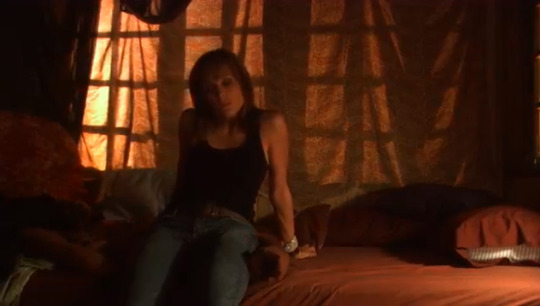
she even tries to awkwardly lean back to show off her muscles like...?????????????????
lol but rewatching this when she lifts her leg up she';s wearing... stiletto boots
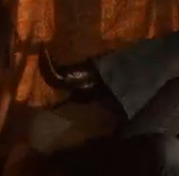
it's the L word you can't talk about butches and butchism because they exist so far pushed to the peripheries of the show but my god ilene chaiken i hate you forever but yeah her haircut sucked shane should be a barista or something
7 notes
·
View notes
Text
Shane mccutcheon - I'm good, yeah, I'm feelin' alright
#the l word#shane mccutcheon#kate moennig#mine#my video#GUYS I DONT WANT TO MAKE A TIKTOK ACCOUNT TO POST EDITS ON BUT POSTING THEM ON TUMBLR IS SO OBNOXIOUS#at least idk how well tumblr really functions with videos bc when i view them on mobile my app explodes#idk... anyway here you go it's simple because i hate after effects#but soon ti will be bass boosted and impossible to look at#enjoy the calm#i genuinely think this is such a funny video but you might disagree#why did she say that
5 notes
·
View notes
Text
my tiktok editing career is happening with the l word stay tuned everyone
4 notes
·
View notes
Text
i started making l word gifs bc i liked their fashion (i still have some unposted sets im working on still that are like fashion archive type stuff) so i kind of have no urge to gif any of generation q because i think.... they look pretty bad... but maybe im wrong ...?
3 notes
·
View notes
Text
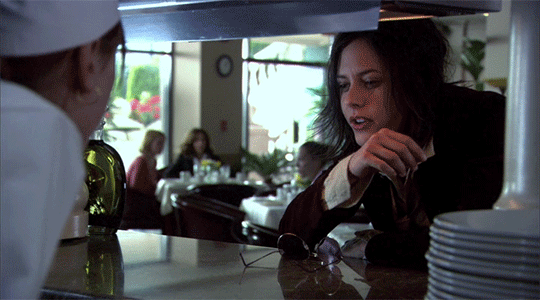
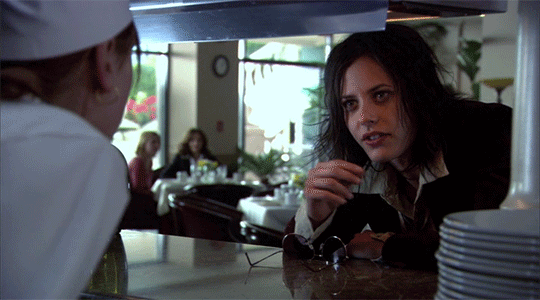
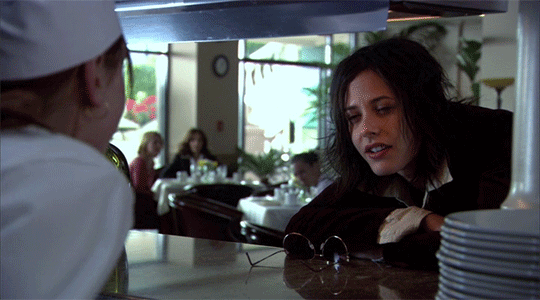
THE L WORD | S1E2 I was just wondering if you had those, uh... you know, those– those… sweet little figs?
#the l word#shane mccutcheon#lara perkins#kate moennig#lauren lee smith#i tried to add subs onto these gifs and let me just say maybe i shouldnt try to edit subs onto gifs when im coming off local anaesthesia#i am ok my feet are just in pain#will i ever move on from season 1 and that one bike episode in s5 lets find out together#oh my god i need to gif molly fuck it all#I NEED JENNY#why did she do this
124 notes
·
View notes
Text
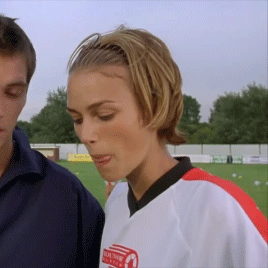
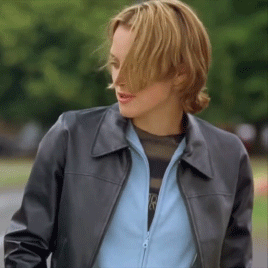
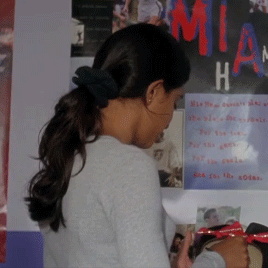
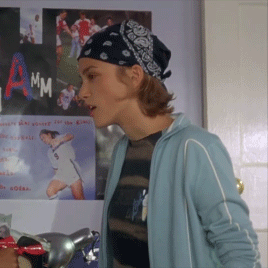
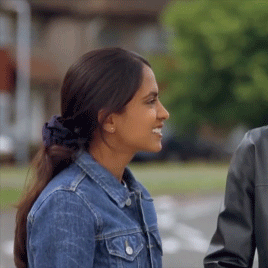
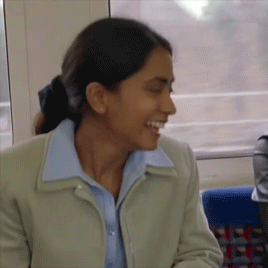
Bend It Like Beckham, 2002.
#bend it like beckham#keira knightley#parminder nagra#i need to remember how to organise a gifset or alternatively not use a scene pack from yt to make one#so cute though#filmgifs#film
159 notes
·
View notes
Text
happy new year! thanks for the support on this intermittently updated blog, let's work hard in the new year
0 notes
Note
Hi, where can I watch the show for free?
hi, so, it's on amazon prime (freeve?? whatever that means??) if you particularly care about quality, but here's some mega drive links i took off someone on twitter which I use to dl episodes to edit with lol:
seasons one, two, three, four, five, and six
now listen to me anon. i am speaking directly in your ear. if you are asking me for links maybe this is your first time watching this show and you got convinced by a sexy gif. THATS FINE. just know its incredible and horrible and i am sorry. but its also amazing,. season 1 is genuinely groundbreaking tv and season 4 is i think the season that this full force nightmare of a show shines best . around that... well i can't say but i admittedly love this thing. a true token of tv lesbians that might never be revisited again in the demise of long winding sitcoms and the age of the netflix era cancelled-after-one-season lesbian show. what the l word disappoints you with in content and quality it will not fail its role: Lesbian Tv Sitcom (technically its a drama but lol)
17 notes
·
View notes